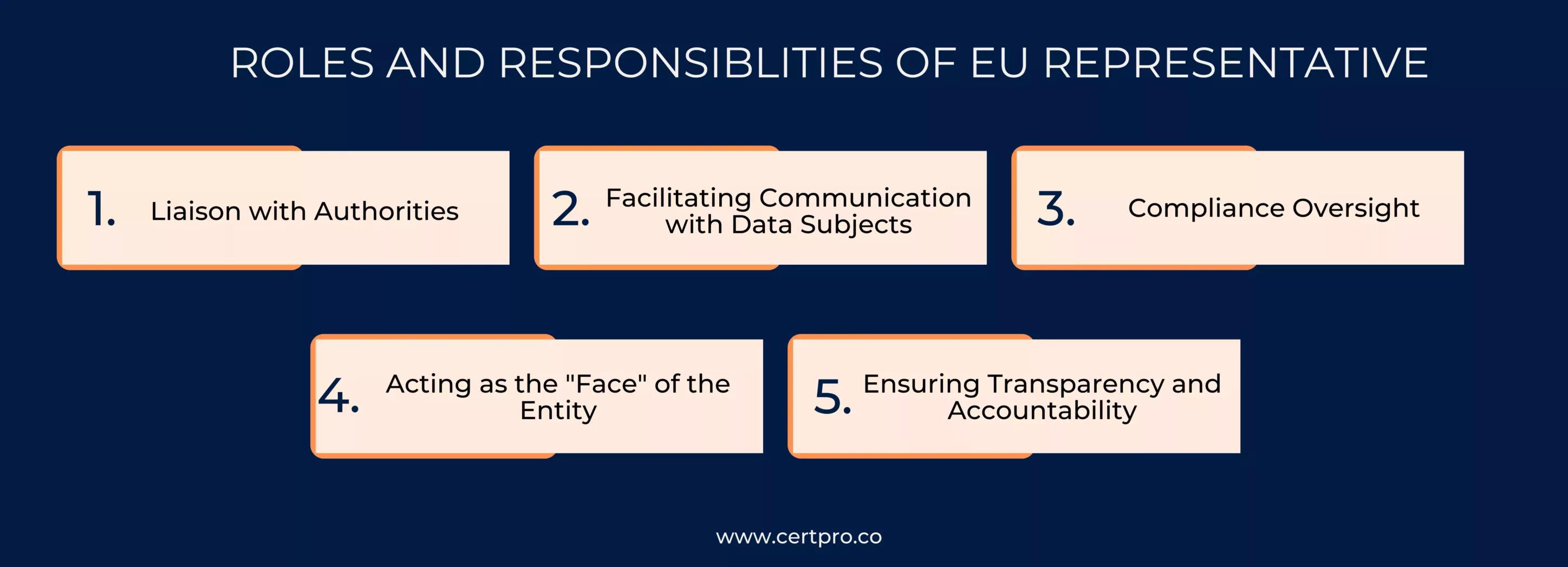The appointed EU Article 27 GDPR representative acts as a contact point for both data protection authorities and individuals, streamlining the reporting and handling of privacy concerns.
By requiring this Article 27 EU representative, It emphasizes the EU’s commitment to extending its stringent data protection standards globally and reinforces the importance of transparency, accountability, and respect for individuals’ rights, irrespective of geographical borders.
In this article, we will be explaining the key role of the GDPR representative, what Article 27 of the GDPR says, what the EU representative is, and the responsibilities of the EU.
WHAT IS ARTICLE 27 OF THE GDPR?
In a globally interconnected environment, it specifically addresses the issues caused by cross-border data processing. It applies to non-EU entities that provide goods or services to EU citizens or monitor their conduct. Even though they are not based in the EU, these businesses must appoint an EU representative.
It specifically states that non-EU organizations are required to appoint an official representative within the EU, known as the “EU Representative.” The Article 27 EU Representative serves as a point of contact for data subjects and supervisory authorities in the EU regarding non-EU organizations data processing operations. This feature is intended to facilitate effective communication and GDPR compliance even if the firm is not geographically situated in the EU.
Who IS AN AUTHORIZED REPRESENTATIVE OF THE EU?
For instance:
- Medical Context: In healthcare, a patient might appoint a trusted family member or friend as their authorized Article 27 GDPR representative to make medical decisions on their behalf if they are unable to do so.
- Legal Proceedings: In legal matters, an attorney acts as an authorized representative to advocate for their client’s interests in court or negotiations.
- Product Regulation: In product regulation, an authorized representative is often required for compliance with certain regulations. For example, medical device manufacturers outside the EU might appoint an EU-authorized representative to fulfill regulatory requirements in that region.
- Data Protection: In the context of the EU General Data Protection Regulation (GDPR), non-EU businesses might appoint an Article 27 EU representative to facilitate communication with EU authorities and data subjects regarding data protection matters.
- Customs and Import/Export: In international trade, importers and exporters might engage authorized representatives to handle customs procedures and documentation.
The role of an authorized It varies depending on the context and the specific responsibilities granted to them. It’s important to establish clear terms of representation to ensure that the authorized representative acts within the boundaries of their authorization and in the best interests of the person or entity they represent.
Note: An EU Representative must and should be a European Union Citizen.

ROLES AND RESPONSIBILITIES OF EU REPRESENTATIVE
This representative takes on a multifaceted role, like:
1. Liaison with Authorities: One of the primary responsibilities of Article 27 EU representative is to serve as a local contact point for EU data protection authorities (DPAs). They act as intermediaries, relaying relevant information between the non-EU entity and the DPAs.
2. Facilitating Communication with Data Subjects: EU representatives act as intermediaries for individuals whose data undergoes processing by non-EU entities. Data subjects have the avenue to connect with these representatives to seek information regarding their data, enact their entitlements, and voice apprehensions regarding data privacy.
3. Compliance Oversight: Maintaining records of data processing activities is a fundamental obligation for both data controllers and processors under Article 27 GDPR. EU representatives assist non-EU entities in fulfilling this requirement.
4. Acting as the “Face” of the Entity: In many cases, the Article 27 EU representative becomes the visible point of contact for the non-EU entity in the EU. This can include receiving official documents, notifications, and legal proceedings on behalf of the entity.
5. Ensuring Transparency and Accountability: EU representatives contribute to transparency by ensuring that individuals are aware of who is processing their data and how they can exercise their rights. They also help enforce accountability by holding the non-EU entity responsible for adhering to Article 27 GDPR principles and requirements.
BENEFITS OF ARTICLE 27 AND EU REPRESENTATIVE
Here are some key benefits of the Article 27 EU representative concept:
1. Global Data Protection Harmonization: It extends the protective umbrella of GDPR beyond the EU’s borders. By requiring non-EU entities to appoint an Article 27 EU representative, the regulation promotes a harmonized approach to data protection across different jurisdictions.
2. Enhanced Accountability and Transparency: The presence of an EU representative fosters transparency and accountability for non-EU entities. It signals a commitment to data protection compliance and demonstrates a proactive stance towards adhering to Article 27 GDPR principles.
3. Safeguarding Data Subjects’ Rights: The EU Article 27 GDPR representative acts as a local contact point for data subjects to exercise their rights. This empowers individuals to engage with the entities processing their data, inquire about their personal information, and exert control over how it is handled.
4. Streamlined Communication with Authorities: EU representatives play a pivotal role in facilitating communication between non-EU entities and EU data protection authorities (DPAs).
5. Mitigation of Legal and Regulatory Risks: By complying with this and appointing an EU representative, non-EU entities can mitigate legal and regulatory risks.
6. Market Access and Competitive Edge: In the era of data-conscious consumers, having an EU representative showcases a commitment to data protection.
7. Efficient Handling of Data Breaches: In the unfortunate event of a data breach, having an EU representative can streamline the communication process with both data subjects and supervisory authorities.
8. Adaptability to Regulatory Changes: As data protection laws evolve, having an Article 27 EU representative positions non-EU entities to adapt more swiftly to changing regulations and expectations.
EU REPRESENTATIVE’S VITAL ROLE: ARTICLE 27 IMPACT
Moreover, compliance with this by EU representatives not only opens doors to the EU market but also provides a competitive edge in an era where data privacy is a paramount concern for consumers and partners alike. The presence of an EU representative not only signifies commitment but also facilitates adaptation to evolving data protection regulations.
FAQ
WHAT IS ARTICLE 27 GDPR?
WHY IS AN EU REPRESENTATIVE NECESSARY?
WHO NEEDS TO APPOINT AN EU REPRESENTATIVE?
WHAT RESPONSIBILITIES DOES THE EU REPRESENTATIVE HAVE?
HOW DOES ARTICLE 27 BENEFIT BUSINESS?

About the Author
SUBBAIAH KU
Subbaiah Ku is the Regional Director for CertPro in Oman, bringing a wealth of expertise in process and system auditing. As a seasoned lead assessor, Subbaiah is dedicated to ensuring the highest standards in compliance and security. His unique blend of technical acumen, rooted in Mechanical Engineering, is complemented by a diverse range of certifications and extensive training.
HOW TO CONDUCT A GDPR AUDIT FOR MY BUSINESS?
The General Data Protection Regulation (GDPR) is vital for today's digital landscape. It is a cornerstone for safeguarding people's privacy rights in the European Union (EU). Therefore, organizations dealing with EU residents' data must follow these GDPR rules....
GDPR DATA BREACH NOTIFICATION: THE ULTIMATE GUIDELINE FOR SECURING DATA
Modern businesses require incorporating personal data protection strategies to ensure customer satisfaction and business growth. In this respect, the European Union's General Data Protection Regulation (GDPR) sets strict standards for maintaining data security....
GDPR Compliance Software: Boosting Business Efficiency
Handling large amounts of personal data has become a significant concern in today's digital landscape, necessitating a thorough understanding of the intricate legal framework, particularly within the European Union. An essential piece of legislation in this regard is...




